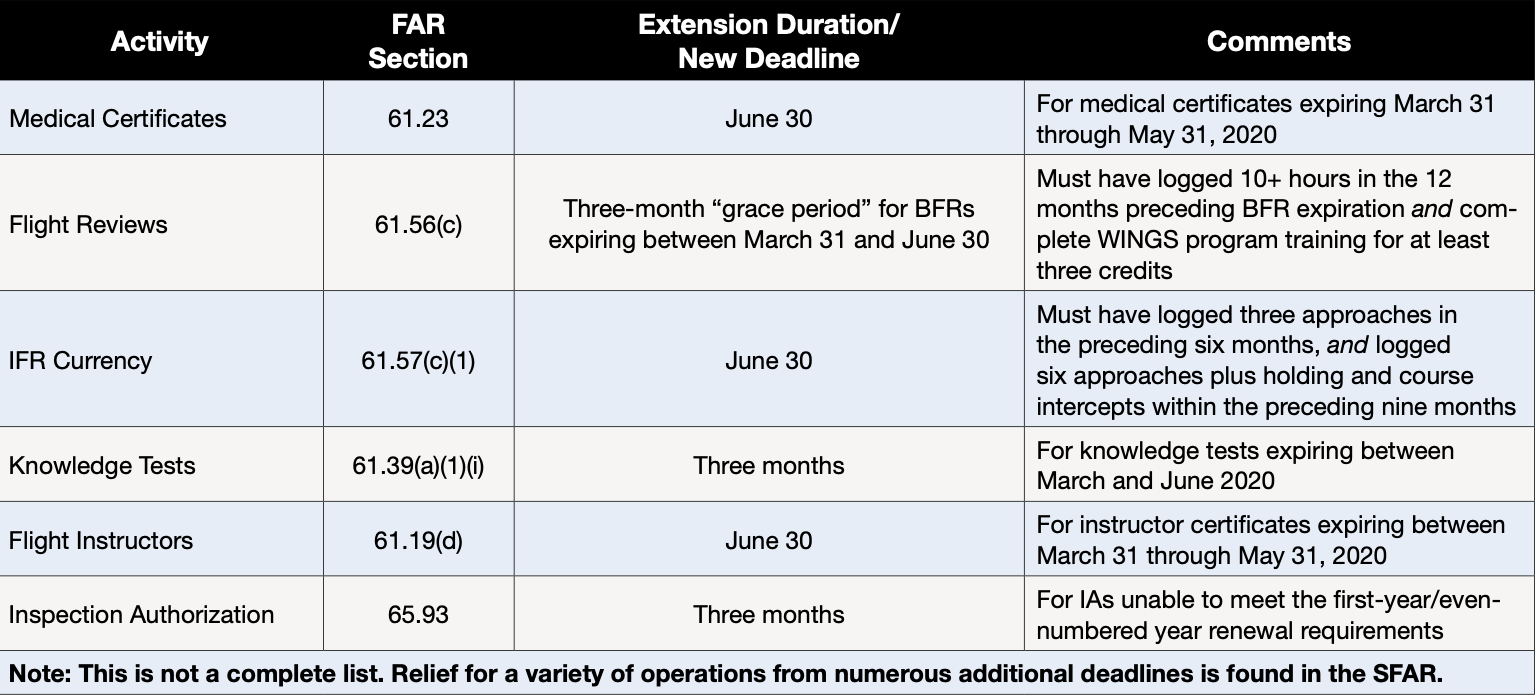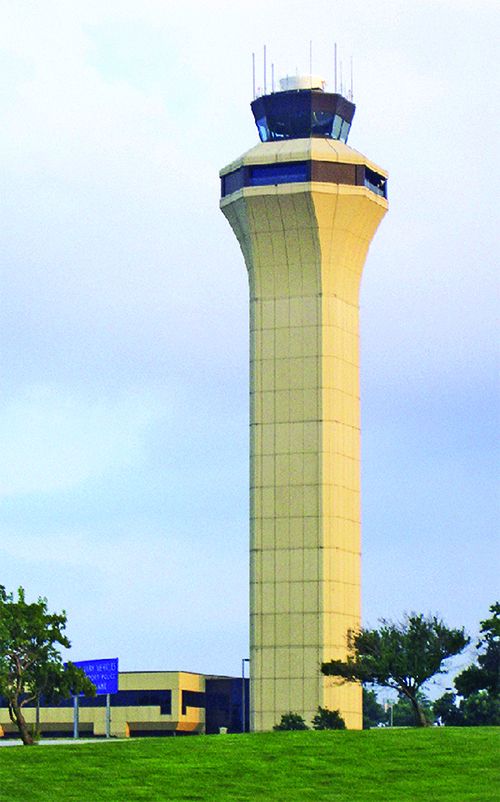The FAA on April 29, 2020, released a special federal aviation regulation (SFAR 118—Relief For Certain Persons during the Coronavirus Disease 2019 (COVID-19) Outbreak) “to enable individuals to continue to exercise their airman certificate privileges during the national emergency.” Generally, the SFAR recognizes the incompatibility of flight training with social distancing and extends to June 30, 2020, certain deadlines for flight reviews, instrument proficiency and other requirements. Notably, expiration of a maintenance technician’s inspection authorization may be extended to March 31, 2021, under certain conditions. The table below details some of the temporary deadline extensions.
“Without this final rule, certain individuals will not be able to continue exercising privileges in support of essential operations due to their inability to satisfy certain training, recent experience, testing, and checking requirements,” the FAA noted in the SFAR. “Additionally, other individuals may – to the extent possible given closures – attempt to satisfy requirements through means contrary to the national social distancing guidelines in order to avoid economic burdens resulting from non-compliance with FAA regulations,” the agency said.
DETAILS MATTER
Of course, the large print giveth while the small print taketh away, and there are some prerequisites to be met before a pilot may be eligible for the SFAR’s relief. For example, the deadline extensions apply to pilots exercising the privileges of at least a commercial certificate. Private pilots may benefit from the SFAR subject to some limitations, including the flight’s purpose. For a private pilot, the SFAR’s extensions apply to charitable medical flights, private agricultural operations and only those pilots with at least 500 hours total time, of which at least 400 hours must be as pilot-in-command and at least 50 hours must have been accrued in the preceding 12 months.

Even so, the private pilot’s flight must be “incidental to that person’s business or employment…in support of family medical needs or to transport essential goods…necessary to fly an aircraft to a location in order to meet [other requirements] or…to transport essential goods and medical supplies” meeting public health needs.
Alas, there’s no free lunch, however meager. For example, to be eligible for the SFAR’s three-month “grace period” for an expired flight review under FAR 61.56(c) pilots must have logged at least 10 hours of flight time as pilot in command in the 12 months before the flight review was due and earned at least three credits from the FAA’s WINGS program in January 2020 or later. The recent-experience requirement in FAR 61.57(c)(1) for flight under IFR is extended only if the pilot “has performed the required tasks within the nine calendar months preceding the month of the flight, instead of the preceding six calendar months.”
On March 26, 2020, and as reported in our May 2020 issue, the FAA stated it would not take enforcement action against holders of medical certificates set to expire between March 31, 2020, and June 30, 2020, “based on noncompliance with medical certificate duration standards.” The SFAR formalizes that policy by establishing June 30, 2020, as the expiration data for those medical certificates.
The FAA is temporarily adjusting the operating hours of some 93 air traffic control towers (ATCTs) throughout the U.S. The agency said the operating-hour adjustments will help ensure continued safe flight operations while minimizing health risks to its workforce and that it planned to begin making the adjustments on Monday, April 27, and complete the process within about a week.
“These facilities have seen a significant reduction in flights, especially during the evening and nighttime hours, since the pandemic began,” the FAA said in a statement. “Adjusting the operating hours will further protect our employees and reduce the possibility of temporary tower closures from COVID-19 exposures by ensuring enough controllers are available to staff the facilities during peak hours. It also will enable us to allocate difficult-to-source supplies where they are most needed,” the agency said.
Most of the ATCTs listed already do not operate 24/7. As always, check Notams. The list of the airports with ATCTs subject to adjusted operating hours is available online at the FAA’s web site at tinyurl.com/SAFHours, and likely is subject to change.
REACTION
Generally, industry groups welcomed the SFAR. “We are grateful to FAA Administrator Dickson and his team for hearing and acting on NBAA’s request that the agency make this much-needed relief for pilots and operations a top priority,” said NBAA President and CEO Ed Bolen. “In particular, we appreciate the efforts made by Associate Administrator for Aviation Safety Ali Bahrami. The important actions taken on these matters preserves aviation safety, while thoughtfully and appropriately responding to the unprecedented times caused by the COVID-19 crisis.”
“We appreciate the FAA’s work on this relief package,” said AOPA President Mark Baker. “There appear to be some very useful provisions in the 94-page document, and we will address more of its details soon.” Others seemed less impressed, including the Experimental Aircraft Association, which noted recreational flying and flight training didn’t make the SFAR’s cut.
One criticism we’ve already heard is that the deadline extensions—basically two or three months—may not be long enough, given the uncertainties surrounding the Covid-19 pandemic. It was unclear whether the SFAR’s deadline extensions may themselves be extended at some later date if conditions warrant. Additionally, aircraft owners expressed concerns that the SFAR did not address annual inspections, which can be problematic when ferrying airplanes to maintenance facilities is required. The impracticalities of maintaining social distancing when traveling via airlines, rental cars and/or other transportation modes when ferrying an aircraft for scheduled maintenance might unnecessarily expose pilots to Covid-19. It’s likely additional criticisms will be forthcoming.
A copy of SFAR 118 as published on May 4, 2020, is available online at tinyurl.com/SAF-SFAR.




